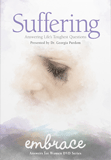Final Lessons from Ground Zero
Guest Commentary by John Fonville
How should we view the horrific terrorist attacks on 11 September 2001? Serious situations require serious answers—from the Word of God.
Two years later, the magnitude of the terrorist attacks against New York City and Washington D.C. of 11 September 2001—a day when America was baptized into the world of terror—is still difficult to put into perspective. Now in 2003, how should we view these horrific events?
Unfortunately, many Christian leaders at the time (and since) reacted in superficial, emotive and sometimes harmful ways. Serious situations require serious answers—from the Word of God.
The reality of the pain and suffering of 9/11 has led many in the US and elsewhere to question God’s love, goodness and power. If God is all-loving, good and all-powerful, how could He allow such suffering?
Although no one, of course, goes through life unaffected by pain and suffering, in the wake of 9/11 more and more people (especially in the West) today are asking questions like: “Where is God during times of suffering? Where is He in the unexpected death of a loved one? Where is God in Sudan, where over 2-million Sudanese Christians have been martyred for their faith?”
The painful events of 11 September caused many to reexamine their lives and even their relationship with God. Attempts to bring healing and satisfying answers to why horrific tragedies occur—regardless of how well-intentioned—have largely failed to provide lasting help because the problem was looked at through the wrong prism. As a result, the question about why God allows such death and suffering still lingers.
It is essential for Christians to possess a proper framework (i.e., a Christian-worldview prism) from which to be able to think correctly about the problem of pain and suffering. If Christians are to offer hope in times of crises, we must view the 9/11 terror attacks from a perspective of the relationship between sin and the sufferings of humanity.
Suffering and sin
The Bible clearly teaches that pain, suffering and death are alien intruders into the “very good” world that God created (Genesis 1 and 3). In Romans 8, Paul reminds us that the whole of creation is now subject to the “bondage of corruption,” and thus it groans and suffers as a result of an alien intruder: sin.
Sin, pain, suffering and death were not part of God’s original creation (and will be eradicated in the new heavens and earth, cf. Isaiah 11; Rev. 21). Ultimately, the pain and suffering we see today is a result of the existence of sin—starting with the first disobedience in the Garden, which led to the Fall of the entire human race and the Curse on all creation.
Paul in Romans 1 declares that suffering can sometimes be the consequence of a person’s sinful choices. In the case of 9/11, it was the sinful choices and actions of the terrorist hijackers that brought about the death of almost 3000 people. As a result, some persons suffer “innocently” by the sinful acts of others (e.g. Deut. 18:10; 2 Kings 16:3). Certainly this was true with respect to the terror attacks on 9/11. The passengers who died on the planes—as well as those in the buildings—suffered as a consequence of the sins of the hijackers. Today around the world, there are billions of poor and hungry (over 24,000 people die from hunger-related causes every day, many times the number who perished in the 9/11 attacks) who suffer from unjust economic and social policies of tyrannical dictators and oppressive governments.
Even where suffering is not the direct consequence of human sin (e.g. someone injured in a forest fire), we know that if sin had not entered the once-perfect creation, there would not even be the possibility of such “bad things.”
Now, what else can be learned? For example, what purpose is there in suffering? What can trials accomplish?
Suffering and the Cross
Faith and hope are essential ingredients necessary to endure trials. For the Christian, pain and suffering can test our faith and help refocus our hope. In Romans 5:3-4, Paul says that suffering is character-building for the believer—that tribulation brings about perseverance, and perseverance, proven character and proven character, hope. It is the Cross of Christ that is the believer’s foundation for the hope and faith needed in order to endure and overcome trials.
Scripture does not guarantee a trial-free life. Take for instance the life of Job, who was “blameless, upright, fearing God and turning away from evil” (Job 1:1). But Christians are given the hopeful promise of an overcoming life through the Cross of Christ (Rom. 8:37). The author of Hebrews states that the key to enduring life’s trials and “winning the race” is faith fixed on the crucified Savior. In Colossians 2, Paul declares that the Cross is the believer’s source of victory over sin and death.
In the past 2,000 years, the darkest moment in history was not 9/11, the Holocaust or the massive African famines of the 20th century. The darkest moment was the crucifixion of Christ. But this darkest moment became God’s brightest victory, for the crucifixion was far from a tragedy (cf. Acts 2). What man meant for evil, God had planned from eternity to turn into a marvelous victory. So whatever the sinful actions of men might hope to achieve, or whatever “natural evil” might occur, we can know that “in all these things we are more than conquerors through him who loved us” (Romans 8:37).
Recommended Resources

Answers in Genesis is an apologetics ministry, dedicated to helping Christians defend their faith and proclaim the good news of Jesus Christ.
- Customer Service 800.778.3390
- © 2024 Answers in Genesis







